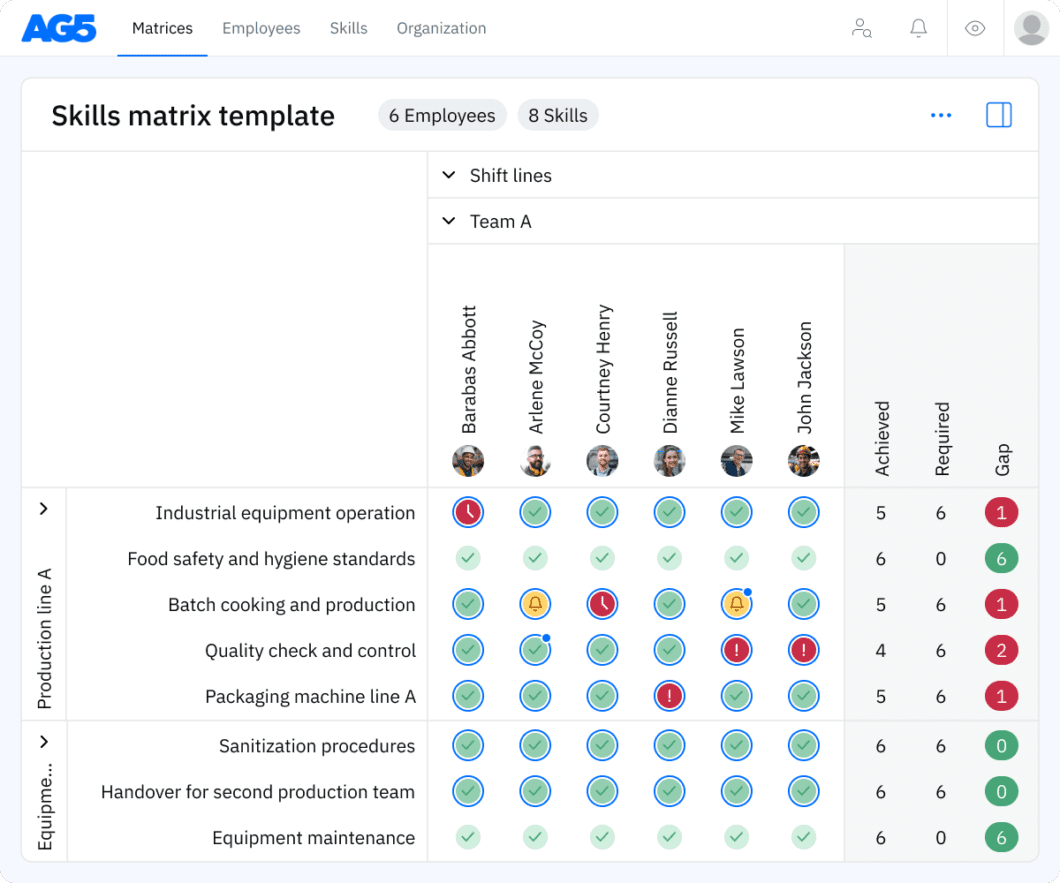Emergency response skills matrix template
A skills matrix template is a tool teams can use to effectively manage and assess their emergency response skills and knowledge.
Download your free template here

Overview Copied
With our free emergency response skills matrix template, you will gain a comprehensive overview of the skills present within your organization and identify any skill gaps that may exist. By utilizing this information, you can develop and implement a strategic plan to ensure that your employees’ emergency response skills are up to date, comprehensive, compliant, and ready for the future.
Emergency preparedness and planning
- Developing and maintaining emergency response plans
- Risk assessment and hazard identification
- Evacuation procedures and emergency drills
- Knowledge of building layouts and emergency exits
- Coordination with external emergency services (e.g., fire, police)
First aid and medical response
- First aid and CPR certification
- Automated External Defibrillator (AED) use
- Treating injuries (e.g., burns, fractures, bleeding)
- Responding to medical emergencies (e.g., heart attack, stroke)
- Administering basic life support (BLS)
Fire safety and response
- Fire extinguisher operation and fire suppression techniques
- Fire drill coordination and evacuation leadership
- Understanding fire alarm systems and activation procedures
- Fire prevention and safety protocols
- Communication with the fire department
Hazardous material response (HAZMAT)
- Knowledge of hazardous material identification and labeling
- HAZMAT incident containment procedures
- Use of personal protective equipment (PPE) for hazardous materials
- Decontamination procedures
- Spill response and reporting protocols
Natural disaster response
- Earthquake preparedness and response
- Flood and water damage control measures
- Tornado or hurricane sheltering procedures
- Managing emergency supplies and kits
- Communicating with employees during natural disasters
Security and lockdown procedures
- Implementing lockdown protocols
- Handling workplace violence and security threats
- Coordination with law enforcement during security incidents
- Managing visitor access during emergencies
- Active shooter response and training
Communication and coordination
- Emergency communication plans and chain of command
- Use of communication tools (e.g., radios, emergency PA systems)
- Crisis communication with stakeholders
- Emergency notification systems (e.g., mass text alerts)
- Reporting incidents to regulatory authorities (e.g., OSHA, EPA)
Training and drills
- Conducting emergency response training sessions
- Leading emergency response drills and simulations
- Updating and improving response plans based on drill outcomes
- Evaluating employee readiness and response during drills
- Continuous training on new emergency protocols and regulations
Benefits Copied
Skills management software is essential in emergency response to efficiently track and manage the skills and qualifications required for handling emergency situations. It enables organizations to identify and allocate personnel with expertise in emergency response protocols, evacuation procedures, and incident management. This ensures a swift and coordinated response, minimizing risks and ensuring the safety of employees and stakeholders.
Download the free Excel Emergency response skills matrix template Copied
We also have a free Excel template available that you can download if you are not ready to get started with AG5. To download it, please complete this form here.
Author Copied
Revisions Copied
Tired of managing skills in Excel?
Say goodbye to Excel matrices. Start using AG5’s plug and play skill matrix software.
Recognized by G2 for Excellence in Skills Management

